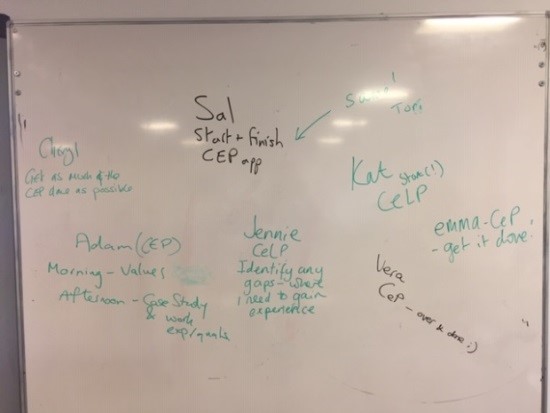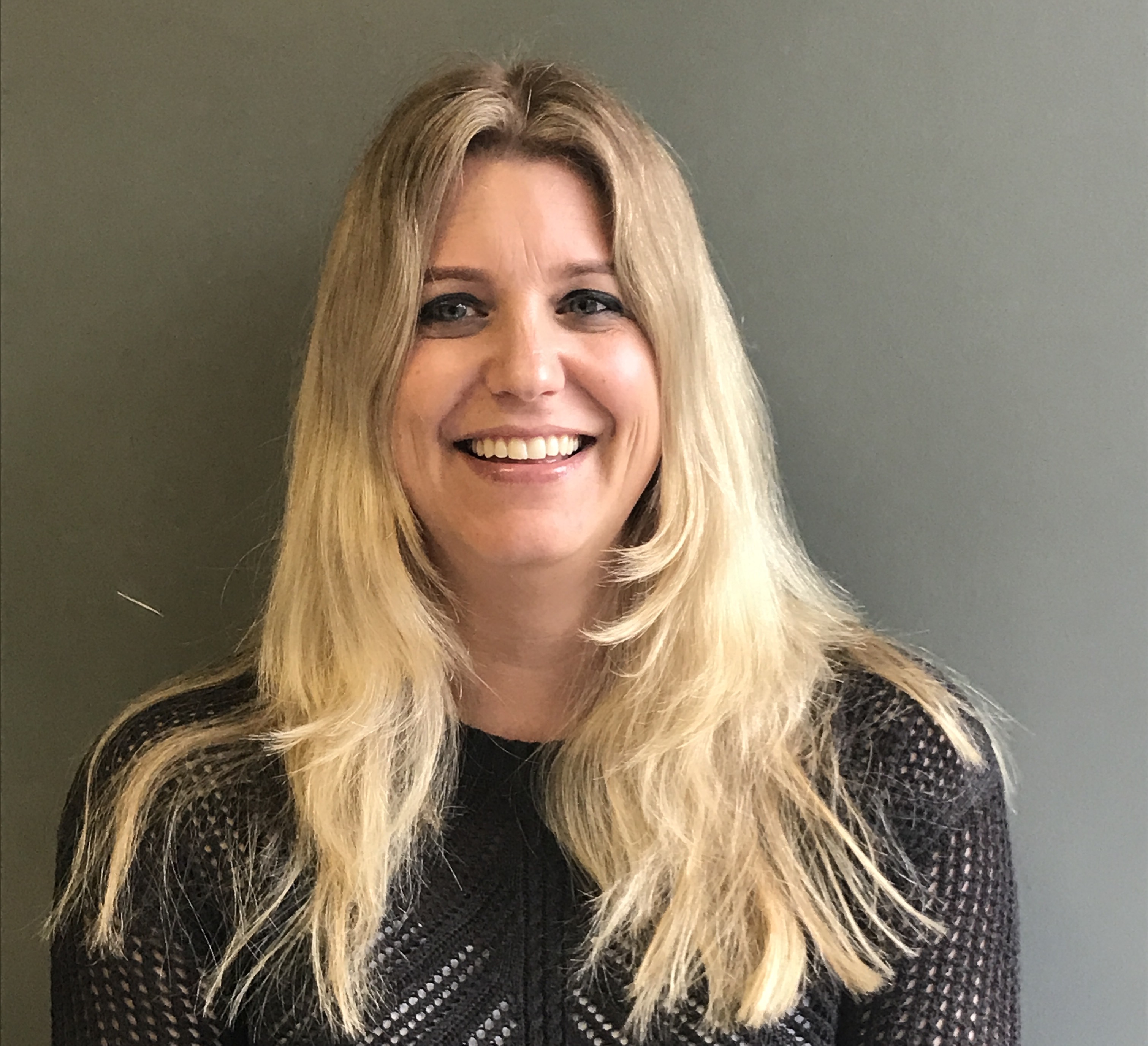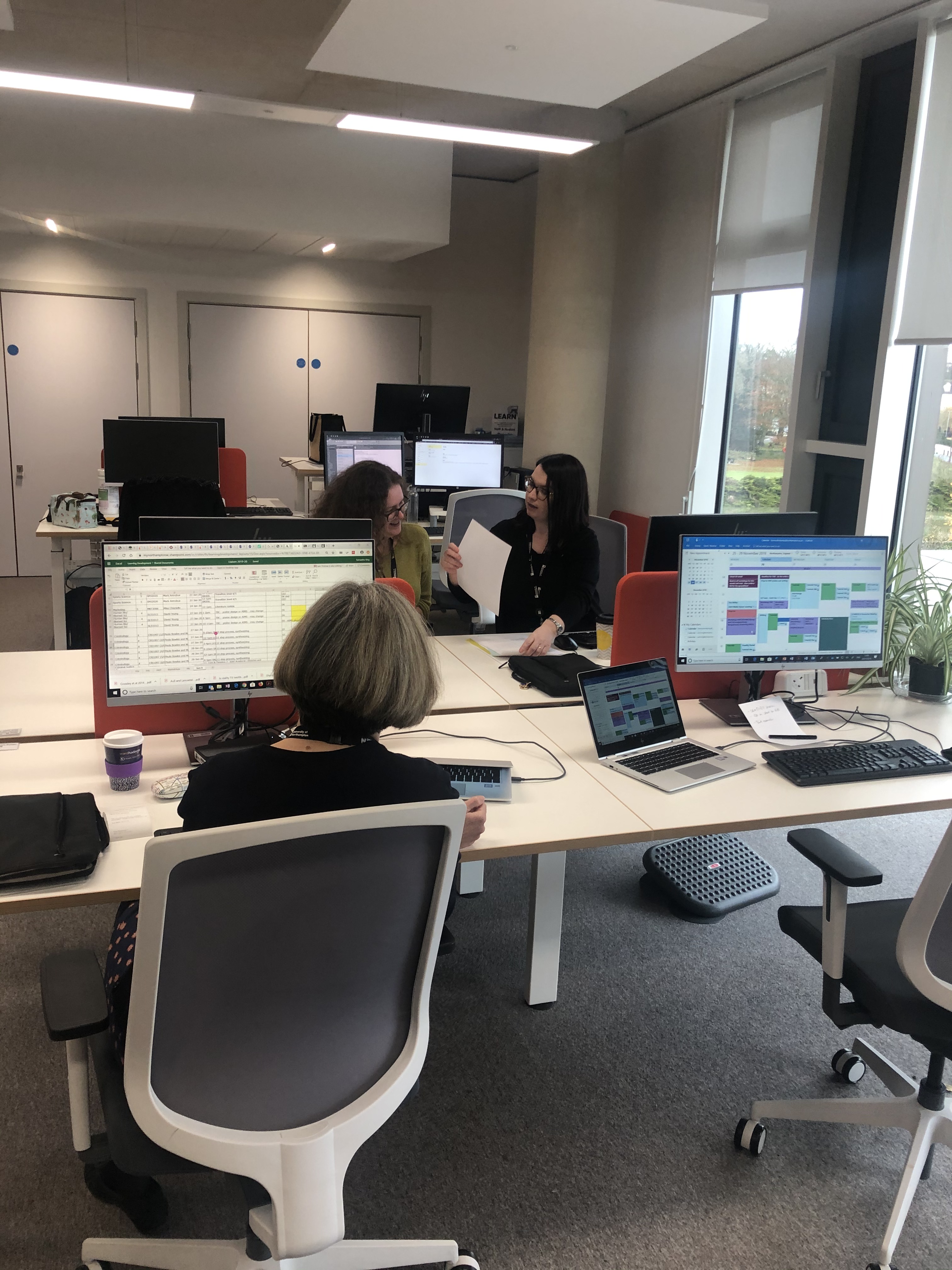This #Take5 post is brought to you from Kate Coulson who is Head of Learning Development at the University of Northampton and has spent most of her career cajoling and persuading colleagues to work with her and more recently to work with the teams she leads…
Our Kate
Selling it: Why engage colleagues?
I always knew I didn’t want to work in a commercial field especially in retail, but on reflection I have evolved into an experienced salesperson: selling connection and collegiality. (If only I worked on commission!) As a Librarian and latterly a Learning Developer I have probably spent the best part of 20 years trying to persuade colleagues to work with me. For librarians, learning technologists, educational- and learning developers, engaging with colleagues is essential to the success of your role.
These days, some colleagues want to concentrate on the tech or the teaching and that is understandable – but let’s not forget the broader dimension of our roles and the value to be found in liaison or collaboration per se. Without this interaction and communication, we don’t know what’s going on in our organisation and we certainly won’t have an influential role.
I’ve learnt by trial and error how to do this in commercial, legal, financial, public and education fields and whilst some ideas haven’t always been successful, I’d like to share my approach in the hope that it might help other learning developers.
I’ll also hold my hands up and state that I am not an expert and I’d love to hear other people’s words of wisdom on this topic as I’m sure I could improve my approach (and I can share it with the team in which I work!).
Our Team
My Way: The ”Coulson” Approach: ‘attacking from all angles, repeatedly but without trying to annoy and in fact trying to charm the intended target’
I discussed this concept on the LDHEN Jiscmail List (www.jiscmail.ac.uk/ldhen) in July 2019 and whilst it doesn’t trip off the tongue, I think it is a good description of the current approach employed by many librarians, LD-ers, LTs and ED-ers within the UK and beyond. I guess the best way to describe it is ‘attacking from all angles, repeatedly but without trying to annoy and in fact trying to charm the intended target’. The “Coulson” approach isn’t going to catch on, is it?! There are however, several aspects to this approach and I’ll summarise them in turn.
University level committees and projects; influencing/writing policy; faculty level meetings
You may not have been officially invited to be on a committee or steering group but use stealth to get your expertise included! Find out who attends these meetings and use your current contacts to approach these individuals to get your views across.
Alternatively, you might try the direct approach – I’ve just boldly invited myself onto a new committee and thought ‘ the chances aren’t high that they’ll include me – but I’ve got nothing to lose’. And guess what?! Include me they did.
Now, I’m not an advocate of endless meetings and committees but sometimes the one or two small comments you make or the people you meet will eventually pay dividends and you’ll be approached to contribute more – and with impact.
New starters, follow up by LD Tutor + liaison model
I personally contact every new member of teaching staff to tell them about the wonderful work undertaken by the Learning Development team… I then ensure that the LD Tutors contact them a few weeks later with a follow up ‘How are you getting on?’ email.
Sometimes this works and I get emails straight back and we then arrange to meet with the individuals. Sometimes we don’t hear anything until after the follow up email and sometimes not at all. However, those emails are useful because when I meet these new colleagues I always say ‘oh yes, I contacted you a few weeks ago about LD – how are you getting on?’ and it opens a dialogue.
This coupled with a liaison model has made influencing and working with others much more fruitful. We “borrowed” the librarian liaison model whereby a tutor is allocated to a subject area. This works well as it allows a good relationship to develop with subject-based staff and a good rapport with students. Librarians have been doing this very well for decades and instead of re-inventing the wheel I unashamedly nicked their approach; talk to your fellow Librarians as they’d love to share their expertise!
Blind Dates – L&T Conferences, Development Days
As a team we try and get invited to all the “parties”: internal L&T conferences; faculty development days; L&T Discussion Groups; reviewing research bids for L&T projects and once we are ‘in’ we get invited back each time!
We always attend L&T events to get our work shared but also to be seen. And so we can chat with other colleagues who may not have read our emails; attended meetings or have missed the LD attack!
We share our research; we create academic posters and we happily get involved in reviewing research bids because we are on the radar.
I’ve only just finished reviewing submissions to the University of Northampton’s student researcher bursaries; I’ve done this for years and it keeps me in touch with what is happening and the research peeps know I that I have an interest.
CPD
Many members of the LD team at Northampton are involved in the academic CPD scheme. We lead, create and teach sessions to our peers around topics such as “designing out plagiarism” to “embedding academic skills within subject areas”.
We also mentor HEA Fellowship and Senior Fellowship candidates and are also part of the accredited panel who award Associate Fellow, Fellow and Senior Fellow to internal candidates.
All this means that we are seen to “know stuff”; we aren’t just ‘support staff’ (that term makes me very cross) and we are appreciated for our expertise in our own right.
But this activity also allows us to work with and alongside colleagues in a different guise and usually results in working on research projects together, team teaching and sometimes emails asking me to check their work/writing/thesis (which is a sign of trust, if ever there was one!). Your turn
Your turn
This is just the tip of the liaison iceberg – there is so much good work happening out there around liaison and getting the LD/ED/LT/Librarian flag noticed. As I said, I would never profess to be an expert and I haven’t listed every tiny thing we do because well, you have better things to do with your day but please share your ideas – I’d love to hear them!
Bio/Blurb
Kate is the Head of Learning Development at the University of Northampton and is also the Secretary of ALDinHE. She has worked in HE for over 10 years in a variety of roles as a librarian and learning developer and has led teams in both areas. In her previous life she worked in the City of London with lawyers, bankers and management consultants but realised she needed to be somewhere where she could use her creativity every day. Kate is a Senior Fellow of the HEA, a professionally qualified librarian, a Certified Leading Practitioner in Learning Development and a passionate advocate of professionals within the so-called “third space” of HE.


